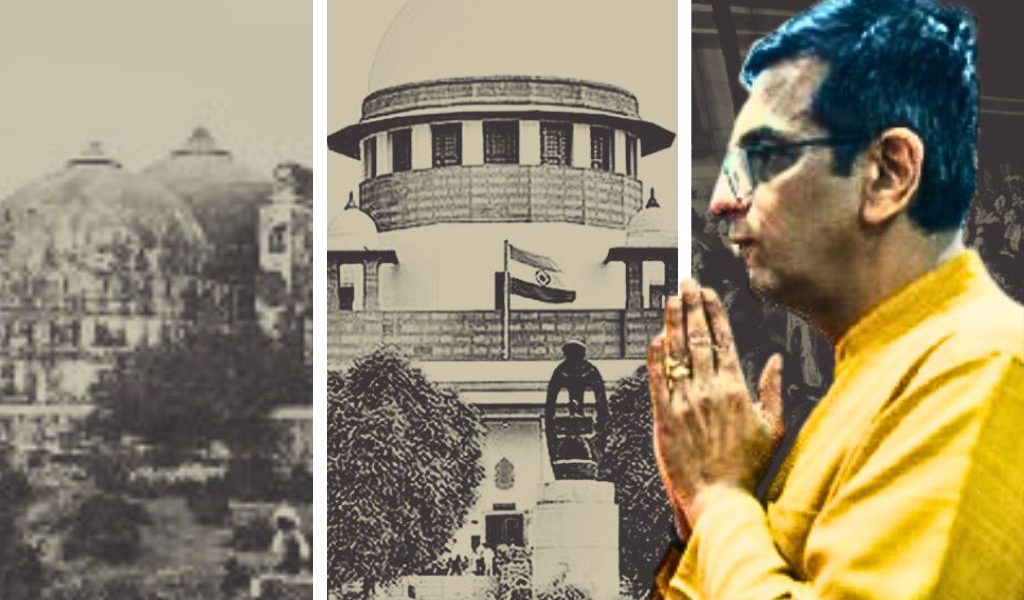Goa is abuzz with excitement as vintage bike and car owners, users, collectors and fans are decking […]

CJ GUIDED BY GOD AND A LEGACY BESMIRCHED! By Harish Khare
In the News, Oct 26- Nov 01 2024 October 25, 2024The modern Indian state’s grand principles of law and constitution cannot be decided by personalised divine inspiration.
Just when the legal fraternity and other concerned citizens were trying to figure out the style and substance of the Chandrachud legacy, the outgoing Chief Justice of India has himself provided an answer: he belongs, unoriginally, to the Shakeel Badayuni School of Jurisprudence, dating back to 1954.As per a PTI story, date-lined Pune, published as a single column news on page number 11 of The Hindu on October 21, Chief Justice of India, D.Y. Chandrachud, told a gathering in his native village, Kanheri in Khed Taluka: “Very often we have cases (to adjudicate) but we don’t arrive at a solution. Something similar happened during the Ayodhya [Ram Janmabhoomi-Babri Masjid dispute] which was in front of me for three months. I sat before the deity and told him he needs to find a solution.” Continuing in this candid vein, the CJI chose to reveal that he prays regularly. “Believe me, if you have faith, God will always find a way.”
Back to the Shakeel Badayuni School of Jurisprudence. Recall (or, better, Google) the 1954 Hindi film, Amar’s song, ‘Insaaf ka mandir hai yah bhagwan ka ghar hai.’ Filmed on the beautiful Madhubala and that personification of ordinariness Dilip Kumar, the song is an eloquent exhortation rendered soulfully by Mohammed Rafi, and put to music by Naushad. As poet Shakeel Badayuni saw it, a temple is not just a place for worship but a site of insaaf – righteous just conduct – and all those who chose to cross the threshold of the inner sanctum must remember that they are enjoined to persevere on the path of righteousness and justness, and those who ignore this injunction would invite the gods’ wrath.
In short: a watchful god is keeping an account.
That song was the encapsulation of the ethos of the early years after the Independence; our society could still distinguish the right from the wrong, the ethical from the unethical and the moral from the immoral. God was not yet pressed into the politicians’ sordid partisan battles. Like the hero in Amar who finally finds his way out of conflicting emotions and confusing choices – “himmat hai to aja ye bhalai ki dagar hai” – CJI Chandrachud seems to be telling us that he allows himself to be guided in his labours as a superior judge by god.
We need not allow ourselves to be detained by the consideration of our national commitment to a scientific temper and whether the CJI’s invocation of the usefulness of divine inspiration and guidance in a judge’s professional judgements and conclusions would influence an assessment of his legacy; but, any second year student at the National Law School in Bengaluru is bound to note that Justice Chandrachud does not look for enlightenment to the ancient philosophers Plato or Aristotle, nor to the medieval Christian fathers St Aquinas and St Augustine, nor to the modern gurus Hobbes, Locke and Rousseau, nor to Jefferson or Madison or modern American giants like Felix Frankfurter or Brandies, nor to any British constitutional luminary, nor even to any of his distinguished predecessors. Instead, he relies on personal inner dialogue and communication with god.
Law school students and faculty all over India can be excused if they find themselves somewhat bewildered by the CJI’s candidness, especially since he chose to contextualise one of the most consequential decisions the higher judiciary took since its founding in 1950 as guided by some kind of conversation with “the deity.” For generations, the law faculty professors have taught their students that the constitution of India was the one and only source of judicial wisdom and constitutional legitimacy. Now, the chief has muddied the intellectual waters. He seems to be suggesting that personal religion can be a reliable guide to judicial clarity.
Granted, everyone from the President of India down to the village patwari is entitled to her personal belief and religious predispositions; yet a modern democratic society, that too the one that is administered as per a constitution, incentivises a political culture that sees to it that professional conduct of all constitutional functionaries remains insulated from the dogmas and doctrines of their religion. That is why, periodically vigilant civil society groups and professional bodies warn us against any kind of sectarian contamination among public servants, from top to bottom. The judiciary, obviously, is not exempted from this expectation.
Admittedly, we live in the age of celebrity and we can understand that as the CJI, Justice D.Y. Chandrachud has often surrendered to the allure of public approbation. It requires both rectitude and certitude to resist the thrall of headlines. Nonetheless, it needs to be noted that he has not enhanced his professional reputation as a wise and sagacious legal mind. Even more disquieting is the demonstration effect of his candidness at his native village: every district judge will now feel emboldened to weave his or her religiosity into judicial pronouncements. As it is, very many members of lower judiciary any way feel inclined to anchor their verdicts and decisions in the prevailing majoritarian slogans and cliches.
In the end, back to Shakeel Badayuni’s admonition of a watchful god ensuring fairness and justice in human conduct would suffice for a society struggling to inch towards modernity and new ideas and legal institutions. The poet has a licence for his imagination; a judge of the Supreme Court has his oath to carry out the mandate of the constitution. The modern Indian state’s grand principles of law and constitution are not to be decided by personalised divine inspiration. Most of his admirers would feel not just disappointed but decidedly diminished that the CJI has so inexplicably chosen to go on record in his native village. A legacy stands besmirched.
Courtesy: The Wire














